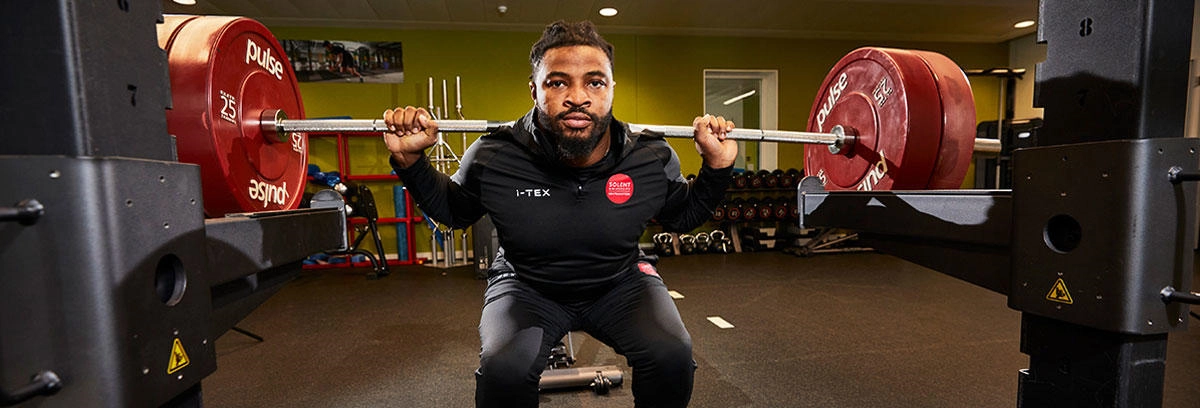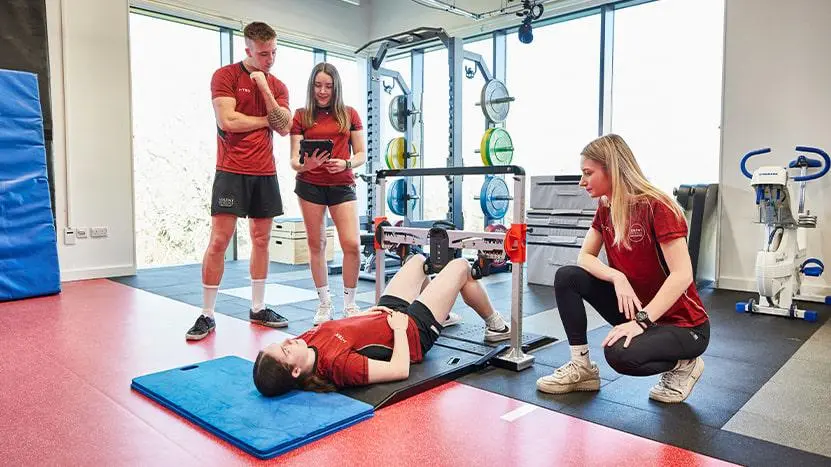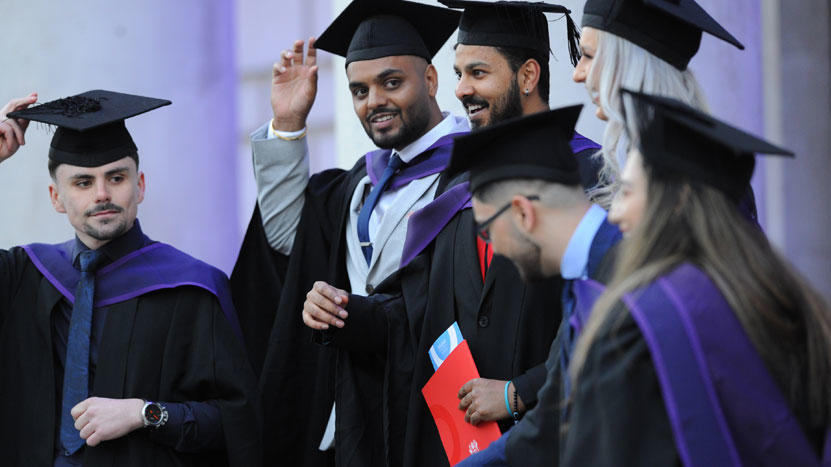MScStrength and Conditioning
Apply direct
- 1 year full-time
- 2 years part-time
Why study a strength and conditioning master's degree at Solent University
Boost your employability and gain the knowledge and experience to graduate as an effective strength and conditioning coach.
- £0minvested in our campus estate and facilities in the last five years
- 0thUK uni for sustained employment (Longitudinal Educational Outcomes, 2022)
- Develop your practical skills via placements within our High Performance Academy assisting the training of University sports teams, scholarship student athletes and talented athletes (TASS) on world-class or Olympic National Governing Body pathway programmes.
- Students have access to the University’s professional sport and exercise science facilities, including a range of innovative equipment such as the isokinetic dynamometer (e.g. for Hamstring: Quadriceps ratio profiling), muscle activity (wireless surface EMG) and more.
- Benefit from our extensive industry links and external sports club relationships, such as Solent’s partnership agreement with Southampton Football Club and a number of governing bodies.
- The course was designed and developed in conjunction with an assessor and tutor from the UKSCA to ensure that it meets the needs of the UKs leading professional body. As a result, graduates will be in a strong position to successfully complete UKSCA Accreditation.
- The content of the course has been mapped to the CIMSPA professional standards in order to meet the demands of industry and produce highly employable graduates.
- Every student at Solent University will also have the option to study an additional Certificate in Practical Artificial Intelligence qualification alongside their course. Free of charge, the course ensures you'll be prepared for a fantastic and varied career after graduation.
Course overview
Strength and Conditioning is an exciting topic examining the science behind athletic physical preparation. A strength and conditioning coach helps to meet the individual needs of their clients and the specific needs of sports competition. They help people increasing their physical activity, prepare for the demands of sport, and bridge the gap returning to play when recovering from injury. Strength and conditioning coaches are also skilled practitioners in the research and application of knowledge into practice. A specialist support service in its own right, strength and conditioning coaches typically operate and provide expertise as part of multi-disciplinary team.
This course is ideal for students progressing on from relevant sports undergraduate courses such as Sport and Exercise Science, Sports Coaching, Sports Therapy or Football Studies. In addition, this course would suit practitioners returning to education to update and develop their knowledge and skills, for example, sports coaches, PE teachers, sports therapists and physiotherapists.
The course is taught one day a week for full-time students. This is designed to provide enough time to read extensively, research topics and work on assignments. It will also provide ample time for gaining coaching experiences and apply knowledge into practice. As you progress through the course you will embed technical competency of resistance training and energy systems development within principles and physiology of strength and conditioning.
You will generate a critical understanding of periodisation and programming to plan and progress your client’s goals over the short-term, medium-term and long-term. You will improve your session effectiveness utilising modern coaching science concepts and psychosocial elements. You will also develop an understanding of the analysis of movement patterns, particularly those related to injury prevention and recovery.
This course has been developed in collaboration with governing bodies and professional bodies to ensure it meets the demands of industry. As part of the course you will benefit from practical hands-on lessons and multiple placement opportunities, both within the University and with external links to facilitate your experiential development.
Course features
Apply direct
You can apply direct to Solent University for this course
Specialist facilities
This course has access to specialist facilities
Part-time option
You can study this course part-time
This course is for
This course is ideally suited to students graduating from an undergraduate degree in sport who want to specialise in the physical preparation of athletes.
You may want to apply the knowledge to a team or sport you already work with, or use the skills and experience gained to align to job descriptions as strength and conditioning coaches at professional sports clubs. Applicants without a suitable undergraduate degree but with considerable industry experience will be considered through interview process.
What this course leads to
Graduates from this course are well prepared for employment as a Strength and Conditioning Coach, for example in professional sports clubs, university sports, private schools and colleges, gym and health clubs or even self-employed.
You may also choose to progress further academically by developing your research interests into a PhD in your chosen specialist subject.
- Strength and Conditioning Coach
- Youth Sports Coach
- Sports Scientist
- Personal Trainer
- Lecturer
- Researcher
Meet the team
The University cannot guarantee any particular members of staff will teach specific aspects of the course in the future, but will endeavour to ensure the teaching team maintains their balance of experience and qualifications.
Facilities
This course benefits from the state-of-the-art sports facilities at Solent University. This includes the £28m sports complex, comprising of multi-use sports halls, multiple gymnasiums, and BASES accredited physiology laboratory and and state-of-the-art biomechanics lab.
Students will have access to, and will be taught how to use, a range of innovative equipment in the form of the isokinetic dynamometer (e.g. for Hamstring: Quadriceps ratio profiling), muscle activity (wireless surface EMG), force measuring devices (e.g. Kistler and Vald ForceDecks force platforms, NordBord, ForceRig, etc), load-velocity profiling and velocity-based training (e.g. GymAware LPT and PushBand accelerometers), as well as 2D and 3D motion capture analysis, speed, agility, plyometric and power testing and training devices. In addition, students will be taught a range of contemporary topics using equipment such as blood flow restriction garments, wearable technology, GPS and much more.
Year one
Core modules
Advanced Physiology of Exercise Testing and Training
Strength and Conditioning practitioners must have appropriate insight into applied human physiology and biomechanics. By undertaking this module you will work within the BASES accredited sport science laboratories (Physiology, Biomechanics, and Strength and conditioning) to consider, in depth, the systemic adaptations to an array of training and recovery stimuli.
Analysing Movement in Exercise and Injury
Strength and Conditioning practitioners should recognise the potential for injury in athletes and their anatomy based on the demands of their sport. By undertaking this module you will perform physiological and biomechanical testing within our BASES accredited sport science laboratories to assess for muscular imbalances, technical incompetency's, and areas of weakness, as well as review training methods to prevent injury and rehabilitate should injury occur.
Applied Research Methods and Study Design
This module aims to promote your knowledge and understanding of the research process, but also to develop the real-world skills necessary to undertake a successful research project. You will develop these skills by undertaking your own research project.
Contemporary Topics in Strength and Conditioning
This module will introduce you to a number of contemporary topics, providing you with an insight into highly relevant, advanced and up to date practices, problems and gaps in knowledge or application.
Developing Effective Coaching Practice
Through this module you will critically evaluate underpinning theory and research and apply them to real-world practice, by planning, delivering and reviewing your coaching skills, including coach-athlete communication, observing and understanding your athletes, adapting the training environment and reflective practice.
Independent Research Project
This is a student-led module and as such the content is largely determined by you under the guidance of your supervisor. The module provides you with an opportunity to undertake a sustained, intensive and independent investigation into a theme of your choosing and present the work in a peer reviewed journal format. It will provide an opportunity for you to demonstrate your scholarly skills within a unique area of study.
Principles of Strength and Conditioning
You will be able to reinforce your appreciation for the fundamental topics and benefit from broadening your knowledge base beyond your own experiences and sporting interests. Vital to postgraduate study is the opportunity you will be given when revisiting these central topics to question and critique the evidence behind the underpinning theoretical knowledge and the associated practical skills they serve.
Programming and Periodisation
This module will allow you to examine and question the design process of athletic training, specifically questioning the sequenced ordering of physical conditioning over several months, an annual calendar and beyond into long-term development.
Learning resources
At Solent, our aim is to deliver innovative, inclusive and intellectually stimulating teaching to develop self-confident and highly employable graduates. All our courses are designed with employability in mind, which makes industry-based learning a priority.
Learn transferable skills
You will be supported to develop a range of transferable skills throughout the course. This includes programming, project management, problem-solving, analytical skills, technical writing, teamwork, communication and presentation skills.
These transferable skills empower you to work in a range of different industries after graduation. The course will also equip you with research and academic skills helping those who wish to pursue a PhD or an academic career.
Why choose a career in strength and conditioning?
The strength and conditioning industry has continued to grow, develop and diversify in the UK over the last twenty years. Almost all major sports clubs, universities, colleges and private schools employ specialist strength and conditioning coaches.
What started as an exciting profession working with elite athletes preparing for competition has expanded to cover working with a range of clientele, including recreational athletes, youth athletes, military and emergency service professionals, and many more of all levels of ability.
In addition, many other related professions understand the value developing their strength and conditioning knowledge to help the people they work with become more physically active and effective or to return from injury. These include people such as sports coaches, PE teachers, personal trainers and sports therapists or physiotherapists. At the same time, they benefit from strengthening their own transferable skills and with it their effectiveness leading to greater employability prospects for people able to bridge the gap between previously separate professions.

Solent Careers
The Solent Careers team is committed to getting students into great careers.
While you are studying, the team can help you with finding work experience or placements, link you with a mentor, check your CV, or offer one-to-one guidance.
If you're in your final year, we also have graduate job opportunities just for Solent graduates.

6th
UK uni for sustained employment
Longitudinal Educational Outcomes, 2022
Alumni network
As part of our global alumni community, you can take advantage of a range of benefits.
Whether it's been days or decades since you left us, or you're soon to don your cap and gown, things are constantly changing at Solent. We're always innovating, but we're also immensely proud of our heritage. And that means you.

Research and knowledge exchange
Research doesn't just live in publications and journals - the effects of groundbreaking research can be found everywhere you look. That's why research at Solent has always been firmly rooted in industry needs and real-world application.
Solent University prides itself on carrying out not only pioneering research, but also research that addresses real world problems. We offer opportunities to study for a Master of Philosophy (MPhil) or Doctor of Philosophy (PhD) degree in a number of areas.
At Solent, we want to help you achieve your best and discover new insights. Whether you're thinking about applying for a PhD, or already underway with your research studies, you'll find useful guidance and information in our research pages.
Research at SolentTuition fees
The tuition fees for the 2025/26 academic year are:
- UK and Channel Island full-time fees: £10,400 per year
- International full-time fees: £18,350 per year
For further information, please visit our tuition fees page.
Extra course costs
While most course costs are covered by your tuition fees, some essential resources and optional extras may need to be paid for separately. These additional costs are listed below. For advice on budgeting and managing your money, please contact student.funding@solent.ac.uk.
Alumni discount
Solent alumni are eligible for a 20% reduction of tuition fees if returning to study a postgraduate course.
Find out moreBursaries, scholarships and financial support
Solent University offers a range of bursaries and scholarships that provide financial assistance or waive fees for tuition or accommodation. Each bursary or scholarship has specific eligibility criteria. Check out our bursaries and scholarships pages to find out more.
Cost of living support
At Solent, we understand that the cost of living crisis may be of some concern. To help, we've put together some detailed information to show what support is available and how to make your money go further.
Graduation costs
There is no charge to attend graduation, but you will be required to pay for the rental of your academic gown (approximately £45 per graduate, depending on your award). You may also wish to purchase official photography packages, which range in price from £15 to £200+. Graduation is not compulsory, so if you prefer to have your award sent to you, there is no cost. Extra guest tickets will go on sale after results publication and will be sold on a first-come-first-served basis. The cost per ticket is currently £15. Please note, we do not guarantee there will be any extra tickets available to purchase.
Student finance videos
Discover Solent University Video transcript, with a description of visuals available.Find out what Southampton has to offer Video transcript, with a description of visuals available.
Entry requirements
Please select an option below:
Key entry requirements
An honours degree at 2:2 or higher in relevant subject area.
Significant industry experience will be considered on an individual basis. If you do not have these qualifications or are unsure of your eligibility please contact the University.
Key entry requirements
If you are applying from outside the UK, find information about entry requirements, visas and agents for your country here.
For further information about UK, EU and international qualifications, please contact admissions.
Key entry requirements
If you are applying from outside the UK, find information about entry requirements, visas and agents for your country here.
For further information about UK, EU and international qualifications, please contact admissions.
Note to all international students requiring a visa
All international applicants need to be aware that the English language requirements to attend Solent University, and the English language requirements to obtain a visa from the Home Office, may be different. This means that if you meet the Solent University language requirement to gain a place on the course, you may still have to meet additional requirements to be granted with a visa by the Home Office.
We strongly advise all applicants to visit the Home Office website which outlines all the requirements for a successful visa application and to take a look at our course entry statement document.
Your application checklist
Applications for postgraduate courses can be made at any time prior to the start of the course. However, we strongly recommend you apply at your earliest convenience.
Please ensure you upload the following mandatory documents with your application:
- Two academic references.
- Certified transcripts of qualifications, including English language proficiency if non-UK student.
- Copy of passport.
- Copy of current visa (if applicable).
- A personal statement.
- Employer sponsor form, where appropriate.
Language requirements
Applicants who do not have English as their first language will be required to demonstrate an approved level of proficiency in the use of the English language. The agreed minimum requirements for this course are:
- IELTS minimum 6.5 overall with minimum of 6.0 in writing and a minimum of 5.5 in reading, listening and speaking.
- TOEFL IBT 92 with a minimum of 22 in writing and a minimum of 20 in reading, listening and speaking
- Duolingo English Language Test - 115 overall with minimum of 100 in each component
or equivalent.
Qualifications are checked before enrolment, and international students must bring their original certificates or certified copies when coming to study at the University.
Pre-Sessional English programme
The University also offers a pre-sessional English programme for international students who wish to improve their level of English before starting a degree course.
Study options


Make your application
- 1 year full-time
- 2 years part-time













